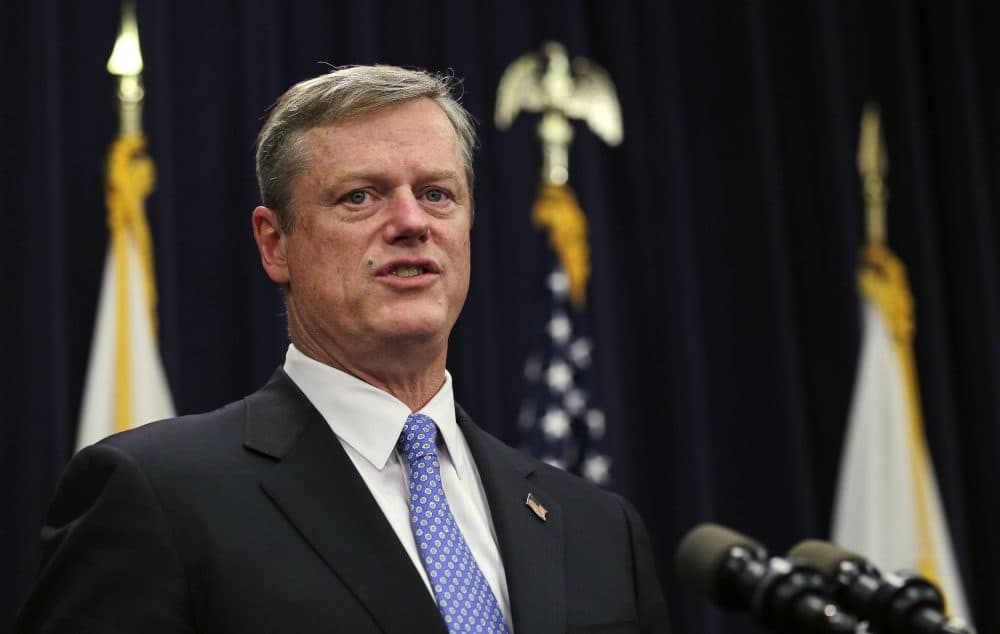Advertisement
Gov. Baker Opposes Work Requirement For Medicaid Recipients

Gov. Charlie Baker is not on board with the wave of states interested in imposing work requirements on certain Medicaid recipients.
The federal government issued guidance Thursday enabling states to pursue a requirement that able-bodied, working age, adult Medicaid recipients work or participate in "community engagement activities" in order to continue receiving health insurance benefits.
"The guidance was just released and we will assess accordingly as we do with any guidance, however the administration does not support applying work requirements to the MassHealth program," Baker spokesman Brendan Moss said in a statement to the News Service. He added, "The Baker-Polito Administration is proud that Massachusetts remains a national leader in access to health care."
Officials in Arizona, Arkansas, Indiana, Kansas, Kentucky, Maine, New Hampshire, North Carolina, Utah and Wisconsin have sent work requirement proposals to the federal government, according to the Centers for Medicare and Medicaid Services, which said the guidance will help states design demonstration projects.
"Medicaid needs to be more flexible so that states can best address the needs of this population," CMS Administrator Seema Verma said in a statement Thursday. "Our fundamental goal is to make a positive and lasting difference in the health and wellness of our beneficiaries, and today's announcement is a step in that direction."
Under the guidance, community engagement activities would include skills training, education, job searching, volunteering or caregiving. Individuals eligible for Medicaid due to a disability, elderly beneficiaries, children and pregnant women would be excluded from any work or community engagement requirements, according to CMS, and the guidance also calls for "reasonable modifications for individuals with opioid addiction and other substance use disorders."
"This new guidance paves the way for states to demonstrate how their ideas will improve the health of Medicaid beneficiaries, as well as potentially improve their economic well-being,” said Brian Neale, director for the Center for Medicaid and CHIP Services at CMS.
The national advocacy group Families USA called the proposed change to the safety net health care program "a radical shift in CMS policy that violates federal law and is part of an ideological agenda that is hostile to government assistance with health coverage."
"CMS's decision to allow Medicaid eligibility to be based on work status is another example of the Trump administration walking away from our nation's core values. This is the latest blow in a continuing campaign to undermine and attack the Medicaid program," Eliot Fishman, senior director of health policy of Families USA, said in a statement. "It is telling that both the Trump administration and the states proposing work requirements also have proposed major cuts to Medicaid that would take away coverage from millions of people. Today's announcement isn't about work: it is about taking away health insurance from low-income people."
In Massachusetts, employers are facing a shortage of workers in a low unemployment economy and state officials are struggling to cover the cost of growing Medicaid enrollment in the face of threatened cuts in federal health care spending.
In November, during remarks at a National Association of Medicaid Directors conference, Verma said the federal government was "resetting" the Medicaid partnership between the federal and state governments and said the agency would give the green light to "community engagement" proposals.
"One of the things that states have told us time and time again is that they want more flexibility to engage their working-age, able-bodied citizens on Medicaid. They want to develop programs that will help them break the chains of poverty and live up to their fullest potential. We support this," Verma said, according to her prepared remarks. "As Medicaid has expanded to able-bodied individuals, the needs of this population are even more imperative. These are individuals who are physically capable of being actively engaged in their communities, whether it be through working, volunteering, going to school or obtaining job training. Let me be clear to everyone in this room, we will approve proposals that promote community engagement activities."